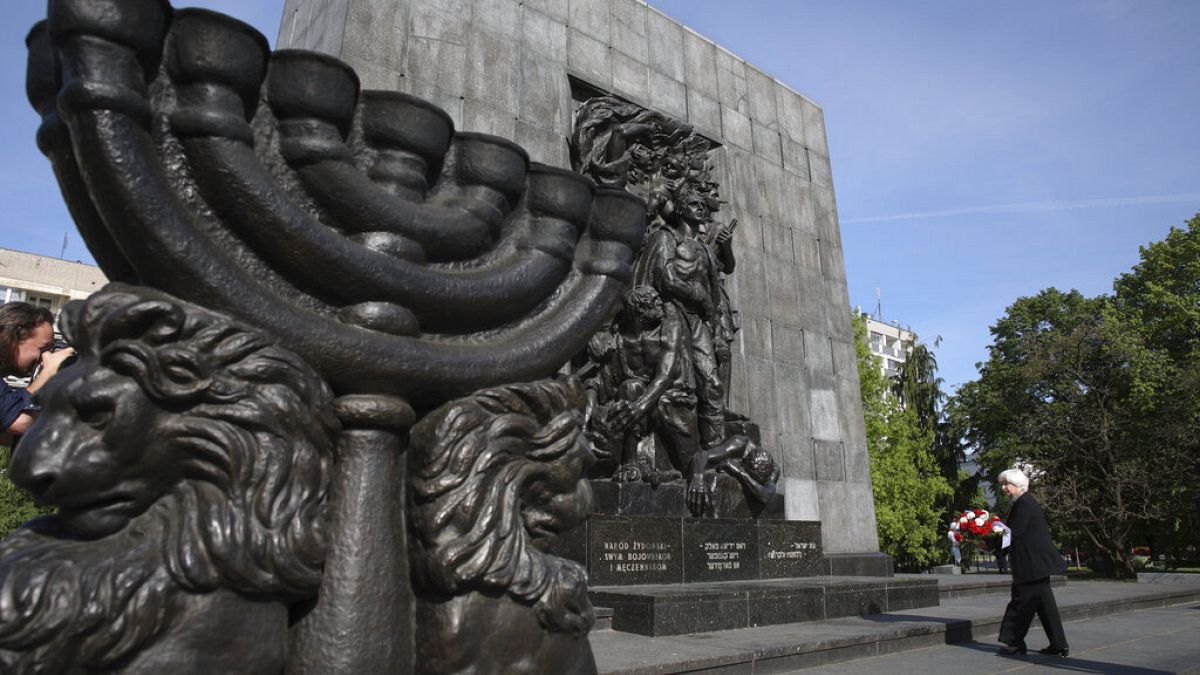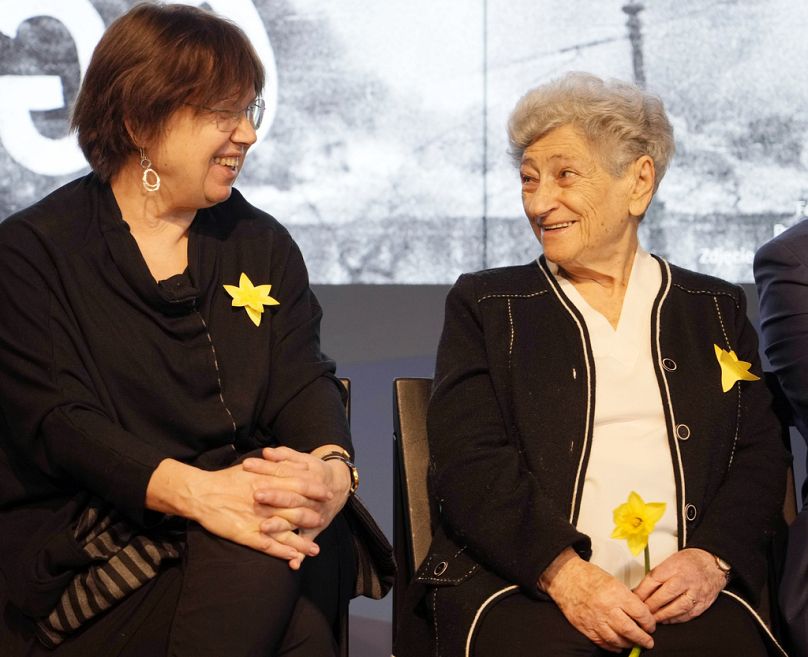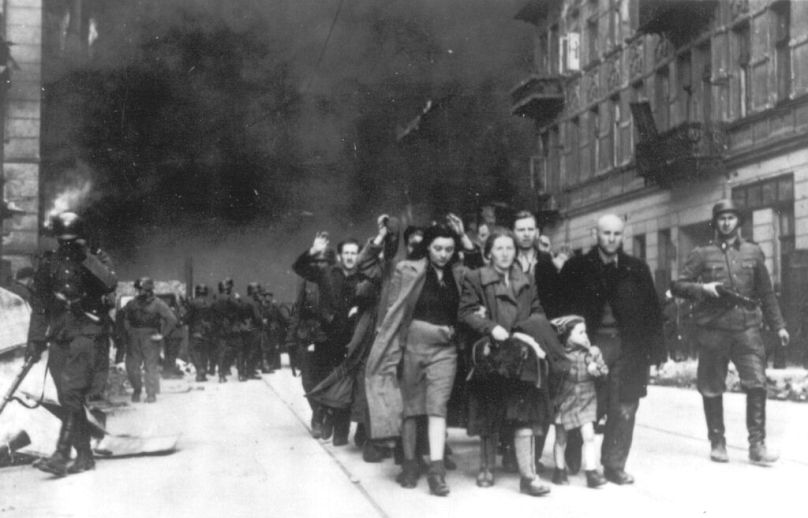Polish academics have come under fire and faced threats of funding cuts for criticising the role of ethnic Poles in helping Jews escape Nazi persecution.
Poland's academic freedom is under threat as scholars risk having their funding cut and being publicly shamed if their work does not align with the government's beliefs, especially their interpretation of key historical turning points such as World War II.
Although independent-thinking academics have been targeted before, the current onslaught was sparked by a statement by Holocaust scholar Barbara Engelking on the 80th anniversary of the Warsaw Ghetto Uprising, questioning the assistance provided to Jews during the Holocaust.
Experts fear this could lead to a culture of self-censorship, where Polish scholars could be wary of speaking out for fear of financial retribution.
Mateusz Morawiecki called her research scandalous and anti-Polish, and Przemysław Czarnek referred to it as "insolence".
"I will not propose increasing the salaries of scientists who offend Poles," Czarnek told the RMF radio station in late April.
The issue could become a major talking point in a country that relies so heavily on its victimhood narrative, as it approaches its parliamentary elections later this year.
What did Engelking actually say?
In an interview for the independent TVN channel, Engelking — a renowned Holocaust scholar and the Director of the Polish Centre for Holocaust Research, part of the Polish Academy of Sciences — said that the history of Warsaw Ghetto Uprising is often romanticised as part of the joint struggle against the Nazi occupation of Poland launched in 1939.
There is no doubt that the ghetto uprising is one of the most tragic episodes of the occupation of the Polish capital. By organising among themselves and smuggling weapons into the ghetto, Polish Jews — forced from their homes and into the ghetto, decided to resist the German SS decision to send them to the Majdanek and Treblinka extermination camps in April 1943.
As punishment for their refusal to surrender, the Nazis burned the ghetto block by block, killing over 13,000 Jews.
During the interview, Engelking talked about how her research suggested the Polish population played a rather limited role in aiding the Jewish resistance.
“It wasn't like Poles who wanted to help them were bustling around them. It may only look like this in false propaganda," explained Engelking. “They really faced the greatest danger on a daily basis from Poles and their neighbors… there were whole gangs that watched people leaving [the ghetto], approached and accosted them.”
“Jews were unbelievably disappointed with Poles during the war. Jews knew what to expect from the Germans. Germany was the enemy. The relationship was very clear. The relationship with Poles was much more complex,” she concluded.
Adding insult to injury, the channel the interview was broadcast on is a subsidiary of Warner Brothers Discovery and Poland's largest private television network, often perceived as critical of the ruling right-wing Law and Justice, or PiS, party.
The citizens of Poland have the highest count of individuals who have been recognised by Yad Vashem — Israel's official memorial institute for the victims of the Holocaust — as Righteous Among the Nations, with 7,177 Polish men and women conferred with the honour, constituting over a quarter of Yad Vashem's total number of recipients.
However, Poland also had one of the largest Jewish populations on the continent before World War II, and it should not be out of the question to speculate whether more could have been done to protect them, 80 years after the war.
Facts getting in the way of mythology
Tom Junes, a historian focused on Central and Eastern Europe, said the reactions to Engelking are a result of a reluctance by certain historians to fudge facts for the purposes of bolstering national pride.
“Engelking’s comments were made as a Holocaust scholar, and her research is well-known,” he explained, highlighting that the government has chosen to react to a statement made by an internationally acclaimed academic and is threatening to revise or reanalyse the funds at the institute where she is employed.
Junes is a historian at the Institute of Political Studies at the Polish Academy of Sciences, the institution that the ministry is considering cutting funding for.
“The [education] minister [Czarnek] is now commissioning universities across the country to research, commune by commune, how many Poles saved Jews during World War II in order to counter these claims. In other words, he is commissioning research merely to fit outcomes he desires. But that is not how history or social science works," Junes exclaimed.
Clash between painful reckoning and victimhood narratives
Junes explained that the government is opting for the more comfortable position of the Polish nation being seen exclusively as a victim, instead of engaging in introspective debate and probing the mistakes of its past.
“Essentially, this is about martyrology and the victimhood narrative. Poles want to be seen solely as victims — victims of Nazi and Soviet occupation, and not perpetrators," he said.
Poland suffered greatly during WWII, with the war being officially launched after the German invasion of the country in September 1939.
The country's central position on the continent and significant size meant it was the subject of a secret non-aggression pact between the Nazi and Soviet government — along with the entirety of Eastern Europe — known as the Molotov-Ribbentrop Pact.
The double whammy of a Soviet and German attack destroyed the country's infrastructure and industry and around 6 million people were killed — about half of which were Jews — crippling what was a bustling economic, cultural and intellectual centre before the war.
Today, the government likes to highlight only the positive roles Poles played in European Jewish history, with PM Morawiecki mentioning how Poland "welcomed European Jews during the worst times of medieval and modern pogroms."
As a refuge for Jews persecuted and expelled from various countries throughout European history, Poland had the world's largest Jewish community at one point — three-quarters of the world's Jews lived there by mid-16th century.
“Yet, this does not correspond with historical reality, and that’s where the controversy comes from. The amount of people denouncing Jews [during WWII] was quite high," explained Junes, while also emphasising that Poland was not an exception in occupied Europe. "People saved Jews and denounced Jews in other countries too."
He also highlighted that interwar antisemitism in Poland, which preceded the Nazi invasion, is often neglected and whitewashed. "Claiming that Poles were not antisemitic and only helping Jews is a blatant falsification of history.”
Communist-era antisemitism takes a new form
After Nazi Germany was squarely defeated, Poland became a satellite state of the Soviet Union. In 1967, student protests broke out in the country against the ruling Polish United Workers' Party.
Protests were sparked by intellectuals and others opposed to communist party control over universities, literature and free thought. The communist leadership chose to attack the Jewish community and reframe the crackdown on the protests as an "anti-Zionist campaign" — citing the alleged ethnic background of some protest leaders as proof they were not acting in Poland's interests.
A leading independent outlet in Poland, Oko Press, has drawn direct parallels between the current government's talking points and those from the "anti-Zionist" crackdowns.
By talking about "enemies from within" who are damaging Poland's international reputation, the current government is using the same antisemitic tropes that were employed in the late 1960s to create a distance and perceived difference between ethnic Poles and Jews.
“In the late 60s, during the Polish communist period, the regime spun a propaganda narrative of the existence a fifth column of Poles of Jewish origin who were traitors. What we’re seeing now is very similar on the rhetorical level. Some people are getting branded as traitors, and that they should be purged or defunded," Junes explains.
This is not the first time the ruling PiS party has used these talking points since it came to power in 2015, stressing the talking point on "traitors in our midst" to mobilise their hardcore electoral base.
The country's Jewish population currently numbers in the low thousands. Junes contended that antisemitic tropes continue to be powerful because people project their prejudices onto "an abstract entity," which is effective because it works "like a myth".
If a prominent figure in Poland has Jewish background or is perceived as having it, "they can easily get branded as being traitors. If these people also end up being liberal or progressive, then they’re even bigger enemies, because they oppose the nationalist camp," Junes concluded.


